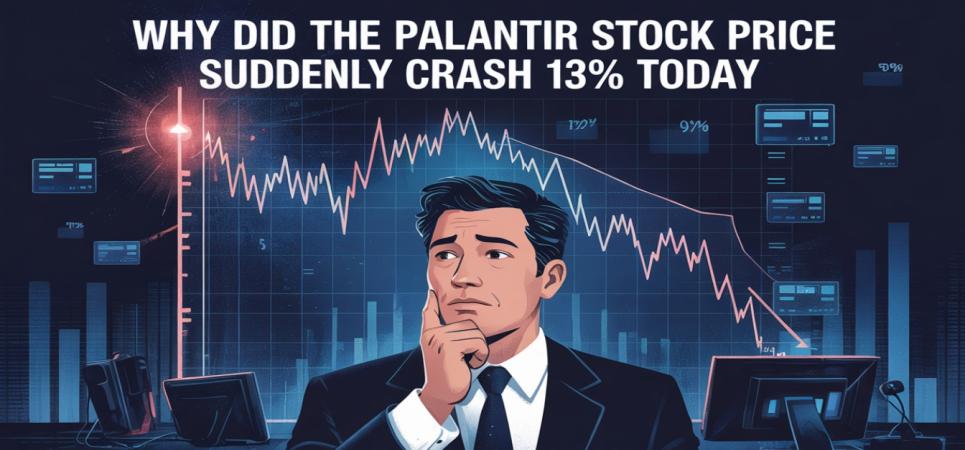
Why did the Palantir Stock Price Suddenly Crash 13% Today?
Introduction
Palantir Technologies Inc. (PLTR) experienced a sharp decline in its stock price on March 22, 2025, dropping 13% in an unexpected drop that left investors confused and wondering why. The reason for the shocking drop can be attributed to several factors that influenced market sentiment and the value of the company.
Analyst downgrades are one of the main causes of the decline in the stock. 22 Wall Street analysts have rated Palantir over the last year, including a consensus "Reduce" rating, as per MarketBeat. 5 of these analysts sell, 13 hold, and just 4 buy the stock. The average price target over the next 12 months is $74.45, with a low of $18.00 and a high of $125.00, which is approximately an 11% decline from current prices.
Technical analysis is also supporting the performance of the stock. Based on MarketBeat, Palantir's shares are near its 50-day simple moving average (SMA). A break below that can continue to decline, possibly to levels of around $73, in line with analyst target consensus. The stock has entered bear market territory, declining over 20% since February 19, 2025. The decline is in line with overall market volatility and investor caution.
MarketBeat
Market forecasts and projections have also influenced investor behavior. Feingold says that artificial intelligence software foresees the stock price of Palantir averaging at $98.33 as of March 31, 2025, a 5.82% increase from current levels. The forecasts vary, with other models projecting a slight decline to $85.00, signaling uncertainty in the market and potential volatility.
Table of Contents:
-
Were there any recent earnings reports that fell short of analyst expectations?
-
Did Palantir announce any unexpected changes in its executive leadership team?
-
Have there been any recent downgrades or negative reports from financial analysts regarding Palantir?
-
Is Palantir facing any new legal challenges or regulatory investigations?
-
Have any major institutional investors recently reduced their holdings in Palantir?
-
Did Palantir release any new products or services that were poorly received by the market?
-
Are there broader market trends or economic indicators that could be impacting technology stocks like Palantir?
-
Has there been increased competition in Palantir's industry affecting its market share?
-
Conclusion
-
Frequently Asked Questions (FAQ's)
Were there any recent earnings reports that fell short of analyst expectations?
Palantir Technologies Inc. (PLTR) has consistently beaten and even surpassed analysts' estimates in its recent earnings releases. For example, in the fourth quarter of 2024, Palantir released adjusted EPS of $0.14, higher than the estimated $0.11. On the same level, in the third quarter of 2024, the company posted an adjusted EPS of $0.10, higher than the estimated $0.09. These consistent performances again indicate that Palantir had not recently failed to meet analysts' estimates.
But it's also worth observing that aside from these beats on earnings, some valuation and insider selling concerns have been on Palantir, by analysts. For example, Jefferies analysts have an Underperform rating and price target of $60, ascribing the firm's 45 times estimated 2026 earnings valuation and top-heavy insider selling, including the sale by co-founder Stephen Cohen of stock with a value of $310 million. These have resulted in volatility in the stock price of Palantir, even during its earnings history.
Did Palantir announce any unexpected changes in its executive leadership team?
Palantir Technologies Inc. recently made a public announcement about executive management updates. On February 25, 2025, Heather Planishek resigned as Chief Accounting Officer.
After her resignation, David Glazer, the company's Chief Financial Officer and Treasurer, served as the principal accounting officer on an interim basis.
Later, on February 27, 2025, Jeffrey Buckley was elected by the Board of Directors to serve as the future Chief Accounting Officer, effective from March 24, 2025.
Have there been any recent downgrades or negative reports from financial analysts regarding Palantir?
Indeed, Palantir Technologies Inc. has lately been downgraded and commented upon adversely by money gurus for mainly reasons of overvaluation as well as insider sale of stock. For example, Jefferies analyst Brent Thill cut Palantir to "Underperform" on grounds of overvaluation and giant-sized insider sales, including the sale of $310 million shares by co-founder Stephen Cohen.
Similarly, Loop Capital's Mark Schappel reduced Palantir's price target to $125 from $141 based on the company's valuation amid a general market decline. Such action has contributed to the volatility in Palantir's stock price and has induced caution among investors.
Is Palantir facing any new legal challenges or regulatory investigations?
Yes, Palantir Technologies Inc. is presently embroiled in a string of legal and regulatory issues:
-
Trade Secret Litigation: On March 10, 2025, Palantir sued Guardian AI Inc. and former colleagues Mayank Jain and Pranav Pillai for trade secret theft. The company claims these defendants stole trade secrets for financial gain.
-
UK NHS Contract Scandal: Legal activists protested the February 2024 UK government redaction of parts of a contract between Palantir and the National Health Service (NHS) for the Federated Data Platform on grounds of concerns regarding transparency and matters related to public trust.
-
Investor Divestment on Human Rights Concerns: In October 2024, Storebrand Asset Management, a Norwegian investor, divested Palantir because the company is involved in actions with Israel, which could violate international humanitarian law and human rights.
Have any major institutional investors recently reduced their holdings in Palantir?
Yes, institutional investors reduced some of their holdings in Palantir Technologies Inc. Some of them are:
-
Straight Path Wealth Management: Reduced its holding by 8.2% in the fourth quarter by selling 2,832 shares and owning 31,771 shares at quarter-end.
-
GraniteShares Advisors LLC: Decreased its holding by 42.3% in the fourth quarter by selling 14,666 shares and owning 19,983 shares. Intellectus
-
Partners LLC: Sold 6,250 shares, reducing its stake by 7.7% in the fourth quarter and owning 74,644 shares thereafter.
All these dips are part of a larger trend as institutional holders of Palantir shares have reduced their holdings, with institutional holders now owning approximately 45.65% of the firm's shares.
This change of ownership of the institution can be influenced by issues like Palantir's share performance and valuation issues. The shares are now near their 50-day moving average, and the experts have identified downside risks based on government contract delays and budget cuts.
Did Palantir release any new products or services that were poorly received by the market?
Palantir Technologies Inc. has, in recent times, rolled out new products and services that, overall, were well received by the market. Palantir unveiled new customer deals and product launches in June 2024 at their AIPCon conference, announcing breakthroughs in artificial intelligence and data analysis for the company.
However, as Palantir remains on such good terms with positive momentum, some of its financial analysts raised alarm regarding its high valuation. For instance, Jefferies' Brent Thill reduced the stock to "underperform" based on its "unsustainable valuation" with a 38 times revenue multiple in 2025. Similarly, Loop Capital's Mark Schappel reduced his price target for Palantir shares, acknowledging the firm's enterprise AI dominance but raising valuation concerns amid a larger market pullback.
These analyst perspectives suggest that although Palantir product solutions continue to mature and respond to market demand, high valuation and market conditions beyond the firm have influenced investor sentiment and stock price.
Are there broader market trends or economic indicators that could be impacting technology stocks like Palantir?
Chief among these are:
-
Inflation Rates: A rise in inflation will have the ability to raise the cost for technology companies, impacting profitability and causing stock price action.
-
Interest Rates: Increased interest rates will increase the cost of borrowing for businesses and decrease spending by consumers, thereby decreasing demand for tech products and services.
-
World Economic Conditions: Volatile or poor economies lead to a reduction in corporate spending on technology, impacting the technology firms' revenues.
-
Geopolitical tensions: Geopolitical tensions and trade tensions can erode supply chains and result in uncertainty, hurting technology stocks.
-
Technological Changes: Unplanned innovation can render existing technologies obsolete, influencing investor perception and share prices.
Has there been increased competition in Palantir's industry affecting its market share?
Yes, Palantir Technologies Inc. is engaged in a very competitive business, and it faces challenges from quite a few significant players:
-
Snowflake: Snowflake is one of the top contenders for Palantir in the data warehousing domain. Experts have identified that even though Palantir possesses higher market capitalization, Snowflake enjoys greater revenue and the same rate of growth.
-
Databricks: Backed by Nvidia, Databricks has been Palantir's long-time competitor, especially in the contracting of U.S. government business. However, in a recent twist, Palantir and Databricks partnered to combine Databricks' data platform with Palantir's AI operating system. The alliance will seek to expand its share in the market and compete better against conventional data platforms.
-
Large Tech Players: Large tech firms like Microsoft, Amazon, and Alphabet are also in the data analytics and AI business, which creates competition for Palantir.
Conclusion
Palantir Technologies Inc. is one of the favorite artificial intelligence, big data analytics, and government contract firms. But similar to all other technology firms, it is not also immune to market forces, competitive forces, and external pressures.
Palantir's share price recently fell sharply by 13%, which raised concerns among investors. There were several reasons for this fall, including analyst downgrades, technical market direction, and heightened competition. Some monetary analysts have expressed concern about Palantir's valuation, which has led to reduced investor confidence. Additionally, big institutional investors have started selling their holdings, which also impacted the performance of the stock.
Another significant factor that affects Palantir is increasing competition from other firms such as Snowflake, and Databricks, and big tech firms such as Microsoft, Google, and Amazon. These firms are also investing heavily in AI and data analytics, and therefore it becomes difficult for Palantir to maintain its market dominance. Although Palantir has formed strategic partnerships, its latest tie-up with Databricks being a case in point, it is still under pressure to secure government and enterprise contracts.
Frequently Asked Questions (FAQ's)
Que: Have institutional investors offloaded their Palantir shares?
Ans: Yes, some institutional investors, such as Straight Path Wealth Management and GraniteShares Advisors, have offloaded some of their Palantir shares, possibly because of valuation and market concerns.
Que: Has Palantir launched any new products that flopped in the market?
Ans: No reported massive product failures have occurred. As Palantir continues to refine AI-powered products, nonetheless, some experts are viewing its price as too elevated despite innovation.
Que: Are economic factors affecting Palantir's share price?
Ans: Indeed, broad macroeconomic factors such as inflation, interest rates, and recessions have had some impact on the stock prices, including affecting Palantir as part of the broader tech market.
Que: Is competition impacting Palantir's market share?
Ans: Yes, there is competition from the likes of Snowflake, Databricks, and other behemoth tech companies like Google and Microsoft. Palantir has joined hands with Databricks to enhance its AI strength, but the competition is fierce.
Que: Should investors be concerned about Palantir's future?
Ans: Palantir remains the data analytics and AI trailblazer, but investors should watch out for volatility in its stock, competition, and risk of regulation. Its long-term growth depends on the company managing these risks.





